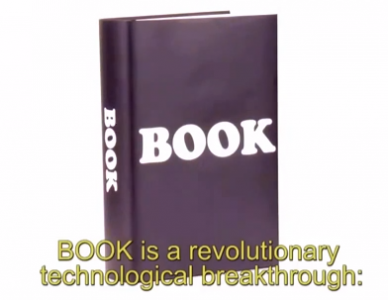Some cool new technologies
December 5, 2013
 [caption id="attachment_2208" align="alignleft" width="388" caption="Introducing Book: a delightful video hosted at http://www.youtube.com/watch?v=YhcPX1wVp38"][/caption]
[caption id="attachment_2208" align="alignleft" width="388" caption="Introducing Book: a delightful video hosted at http://www.youtube.com/watch?v=YhcPX1wVp38"][/caption]
I go back and forth on buying physical vs. electronic books. Recently, I read the Lord of the Rings trilogy on my Kindle, but then just a few days after finishing I bought about half a dozen physical books for my next reads. Physical books have these advantages which I just haven’t been able to get in digital:
Aesthetics. Possibly the main reason. If you’re reading something consequential, it’s nice to have something heavy in your hand with a well-thought out printed cover, heavy paper, and nice typesetting. And something that’s pretty enough to be worth putting on a shelf when you’re finished.
Pages. It’s nice to be able to quickly flip back and forth to a figure or previous idea. You can also tell how close you are to the end as the thickness of the pages under your hands changes.
Cost. Yes, I realize many classic books on Kindle are actually available for free. Still, many books can be had incredibly cheaply, and you can buy used copies of real books as opposed to electronic editions. They also require no expensive electronic devices or access to electricity or communications networks.
Surveillance and tracking. I never imagined I would care about this, but physical books have the nice advantage of being surveillance- and (usually) ad-free, as they don’t require that you carry a device containing antennas or means of data storage. Though I suppose your purchase history can be tracked.
It occurred to me while I was buying these books that at one point, books were a big-deal new technology. Actually, the modern book is the result of combining many, many different big-deal new technologies, including writing, typesetting, printing, binding, paper production, etc. It’s easy to forget this.
I then realized that there are lots of other different big-deal technologies that we don’t think about. Like the bike I just bought, which also has lots of advantages over more recently-invented forms of transportation:
Portability. Bikes let you move fast, but they’re relatively easy to store. Compare cars, which let you move much, much faster but are harder to store. They can also go lots of places that cars can’t go - it’s easy to move past a traffic jam on a bike.
Infrastructure. For cars to work, they require a vast infrastructure of factories, repair shops, retailers of secondary supplies, and roads, not to mention the colossal investments made in petroleum extraction, refinement and distribution (electric cars, of course, need to be plugged in to the grid instead of being fueled up).
Sustainability. Bikes are better for your health, and obviously also require far fewer natural resources to run and maintain.
And the modern bike, too, is a combination of lots of other big-deal technologies - metalworking / woodworking, rubber molding, and classical physics, for example.
Because they’re combinations of lots of different development over time, books and bikes have the nice ability to degrade gracefully in the absence of these technologies. A book can exist without a binding or a cover, or without typesetting or mechnical printing. A bike can have a wooden frame, or even a cardboard frame or a 3D printed frame.
These technologies are well-understood and easy to reason about, and so they’re easily extensible; you can add a book-light to a book or substitute a different type of paper or produce different types of books for different applications. Anybody can make these extensions, specialist knowledge isn’t always required. This “old new” technology is also intrinsically much more maker-friendly.
And there’s still huge money to be made in continuing to extend these technologies, which is maybe what we’re actually seeing with the electronic book (an extension rather than a replacement), and what we’re seeing much more obviously with new devices that are coming out to make bikes easier and more fun to ride, and even more practical.